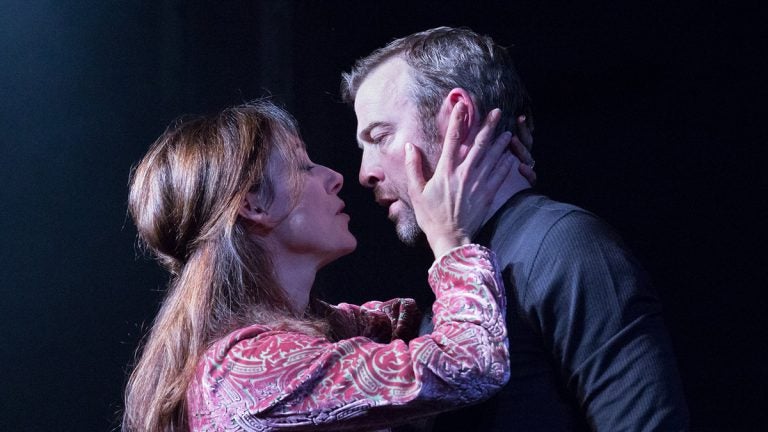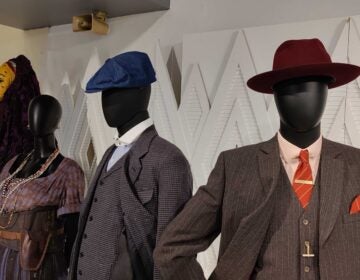Review: ‘Macbeth’ newly faceted
Listen
Judith Lightfoot Clarke and Ian Merrill Peakes are the Macbeths in Arden Theatre Company's production of 'Macbeth.' (Photo courtesy of Mark Garvin)
It’s not just the three sisters who are weird in the current version of “Macbeth” at Arden Theatre Company. Alexander Burns’ production itself is unusual, starting with the editing: Some parts, usually cut down, are expanded. Others, normally included, are whittled or deleted. One pristine scene, almost a tableau, is the coronation of Macbeth and his Lady to king and queen of Scotland – it’s silent, fast and effective and not in the text at all.
The coronation is one of several plusses in Burns’ production, which also has its downsides. Perhaps the biggest plus is Burns himself — the founding artistic director of Quintessence Theatre Group, a professional Mount Airy troupe that caters to the classics. Burns, whose takes on the classics are frequently innovative and surprising at Quintessence, makes his Center City debut with this production.
Every director edits William Shakespeare – the generous length alone makes most of his plays unsuitable for modern productions. Burns makes some unconventional editing choices here, and when they work they add a new dimension to “Macbeth.” I’ve only ever read the full text of the three weird sisters’ declamations, which represent fate, the supernatural, prophecy and other notions you can read into them. Usually, the sisters (played by E. Ashley Izard, Aimé Donna Kelly and Mary Tuomanen) are edited down to the eerie basics. Here, Burns basically lets the text alone, and the result is as entertaining as it is revealing.
Burns also expands the role of a drunken porter, played with perfect comic timing by Christopher Patrick Mullen, a crowd-pleaser by any standard. Shakespeare wrote the role to play to the audience. Mullen tweaks it to play with the audience. Mullen is loose as possible with the text, but his stage-bit serves the comic relief the Bard intended in one of the play’s tense spots. Shakespeare purists: Be enraged at your own risk.
The underside of Burns’ choices comes when the stage business, meant to enhance the text, actually diminishes it. This “Macbeth” begins with the battle that’s only alluded to in the text, before Macbeth returns to the court of Scotland as a victorious hero – but because some small dialogue is omitted, it may take a while to figure out what the fuss is about when Macbeth does come home. In the play’s final fighting – Paul Dennhardt’s fight direction yields realistic results – Burns plugs in a pause while a piece of news sinks into Macbeth’s head. It sucks the energy from the action.
And Lady Macbeth’s death at her own hand – I don’t think I’m revealing anything after all these hundreds of years – turns the play into clumsy melodrama for 30 seconds. Until now, James Sugg’s sound design has been a chilling mix of thunder, bells, tones and between-scene chords. But when Macbeth carries his dead Lady on stage, it’s requiem time with full orchestral clout. It didn’t tingle me, it tickled me – not the aimed-for response.
Whatever you may like or not about this “Macbeth,” it never lags – Burns packs all the essentials into two hours (including the intermission). The facile and forceful Ian Merrill Peakes, in his 19th Arden production, is the nuanced Macbeth of your dreams – increasingly tyrannical but clearly unsure of himself even as he declares each murderous intention. (His easy delivery of Shakespeare is also great to listen to.) As Lady Macbeth, Judith Lightfoot Clarke notices her husband’s weak spots and takes complete charge. “Unsex me here!” Lady Macbeth commands herself, looking to behave more like an Elizabethan version of a man, and Clarke slinks around alluringly dressed in red (Rosemarie E. McKelvey’s good-looking mishmash of costume styles) but becomes gruffer, more rough-edged. There’s heat between Peakes and Clarke on stage – ultimately, each builds a character composed of 100 percent ambition, zero percent shame.
Other players in the supporting cast – Josh Carpenter, Ben Dibble, Terence MacSweeny, Ian Bedford, Sean Bradley, Carl Clemons-Hopkins and Jahzeer Terrell – round out the fine cast. I wish the production hadn’t doubled-up on actors playing different characters (or in, one case, quadrupled-up), because many in this ensemble have distinctive faces and can be confusing in dual roles. The balancing factor: Everyone’s top-notch in all of them.
“Macbeth” runs through April 19 at Arden Theatre Company, on Second Street just north of Market Street. 215-922-1122 or www.ardentheatre.org.
WHYY is your source for fact-based, in-depth journalism and information. As a nonprofit organization, we rely on financial support from readers like you. Please give today.




